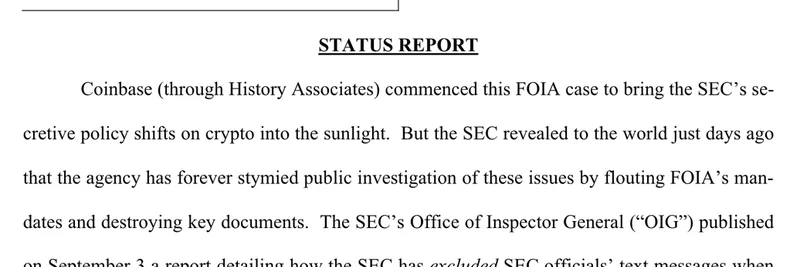In the fast-paced world of crypto, where meme tokens like Dogecoin and newer contenders rise and fall on a whim, regulatory clarity is gold. But what happens when the regulators themselves play fast and loose with the rules? That's exactly the drama unfolding in a recent X thread from Paul Grewal, Coinbase's Chief Legal Officer. On September 11, 2025, Grewal dropped a thread calling out the U.S. Securities and Exchange Commission (SEC) for destroying documents they were legally obligated to keep—documents that could shed light on their crypto policies.
Grewal's thread kicks off with a strong accusation: "The Gensler SEC destroyed documents they were required to preserve and produce. We now have proof from the SEC’s own Inspector General." He's referring to a lawsuit filed by History Associates Incorporated (backed by Coinbase) against the SEC under the Freedom of Information Act (FOIA). FOIA is basically a law that lets anyone request government records to promote transparency—think of it as the public's right to know what agencies like the SEC are up to.
The bombshell comes from the SEC's Office of Inspector General (OIG), which released a report on September 3, 2025, detailing how "avoidable errors" led to the loss of a year's worth of text messages from former SEC Chair Gary Gensler. These texts, from October 2022 to September 2023, were wiped during routine IT processes, even though they were subject to FOIA requests. The report also hints that texts from over 20 other high-ranking SEC officials might be at risk or already gone.
As shown in the status report filed in the case (History Associates Incorporated v. U.S. Securities and Exchange Commission, Case No. 1:24-cv-1858-ACR), Coinbase argues this isn't just a whoopsie—it's a "gross violation of public trust." They've been litigating for 14 months, requesting all communications related to crypto regulation and enforcement. Yet, the SEC knew about these issues for two years and didn't disclose them. Now, Coinbase is pushing for expedited discovery, sanctions against the SEC, and the production of any surviving texts.
The irony here is thick. Under Gensler's leadership, the SEC slapped billions in fines on crypto firms for record-keeping failures—think off-channel communications like WhatsApp messages. But when it comes to their own house, it's a different story. Grewal nails it in his thread: "Considering the double-standards of the previous Chair it’s not surprising that the same agency that fined firms billions for record-keeping failures committed the exact same violations."
What Does This Mean for Meme Tokens?
Meme tokens thrive on community hype, viral trends, and often skirt the edges of traditional finance. But they've been in the SEC's crosshairs, with Gensler repeatedly calling out many cryptos as unregistered securities. This FOIA saga could be a game-changer. If the court sides with Coinbase and forces more transparency, we might finally get a peek into how the SEC decides what counts as a security—potentially leading to fairer rules for meme token projects.
For blockchain practitioners building or investing in meme tokens, this highlights the need for robust compliance from the start. Tools like decentralized storage could help preserve records in ways that even regulators can't "accidentally" erase. Plus, with Gensler out of the chair, a new era of crypto-friendly policies might be on the horizon, reducing enforcement actions that have chilled innovation in the meme space.
This isn't just legal jargon; it's about holding power accountable. As Grewal urges, the court needs to step in to prevent future erasures. For more details, check out the full OIG report or dive into Coinbase's FOIA reading room. In the meme token world, where trust is everything, transparency from regulators could meme-ify the entire crypto landscape—for the better.

